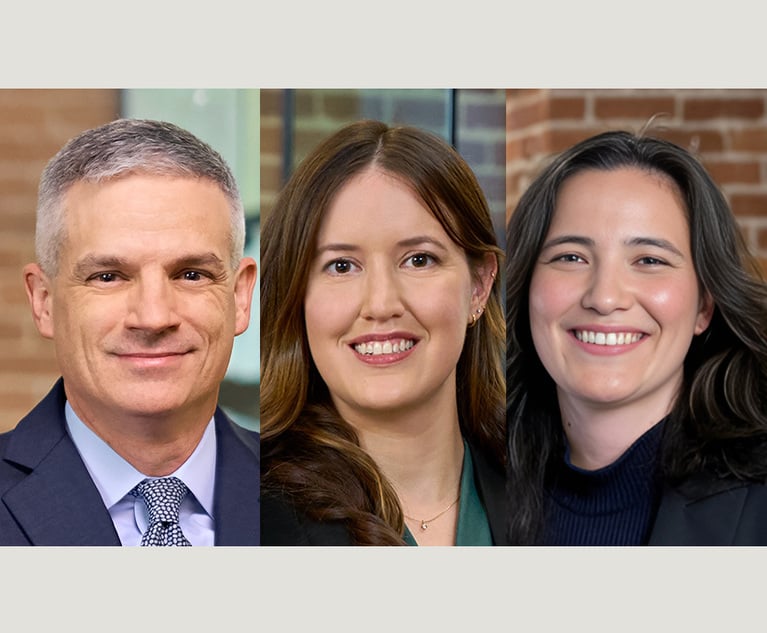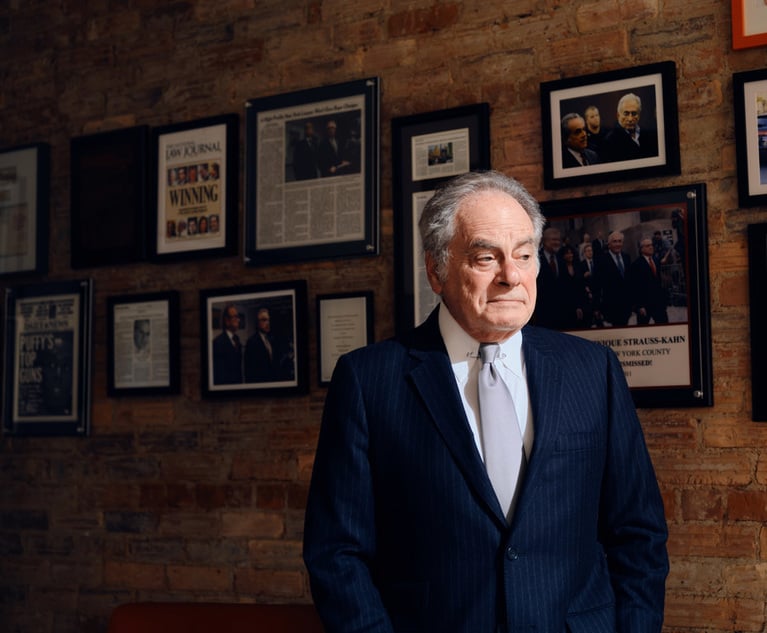Surprise Plea Deals in Los Angeles Water Billing Lawsuit Scandal Signify Much More to Come
Agreements between federal prosecutors and two key figures in the public corruption probe leave plenty of room for more cooperation and more indictments.
December 09, 2021 at 07:03 PM
7 minute read
'The City Did What It Promised'
As the plaintiff attorney now in charge of the class action lawsuit at the center of the scandal, Kabateck is uniquely positioned as both an observer and a player, tasked with ensuring the class he now represents has been fairly compensated while watching as a federal investigation engulfs the key people who came before him.
 Brian S. Kabateck of Kabateck LLP
Brian S. Kabateck of Kabateck LLP Los Angeles County Superior Court Judge Elihu M. Berle appointed him and his firm Kabateck LLP to take over the reopened case in April 2019, nearly two years after approving the $67 million settlement. Kabateck said he's focused on "what happened, and how did it affect the ratepayers, the customers."'
The case is still open—a status conference is scheduled for next Thursday—as 35 LADWP customers appeal a special master's ruling on their refunds claims. But Kabateck and the city have tentatively agreed on fees, according to minutes from a Nov. 18 conference, and Kabateck said in an interview he's sure ratepayers received the refunds they were properly due.
"I have a high level of confidence that the city did what it promised to do once there was a settlement," Kabateck said.
"It's now been not just checked but triple checked that the intent of this settlement—the spirit of the settlement—has been fulfilled," Kabateck continued. "My investigation revealed that."
Kabateck said Paradis refused to cooperate with his investigation.
"He was not cooperative in 2019, and he was combative. His lawyers were combative with my investigation. … So yeah, I am surprised that now this has changed," Kabateck said. "As of recently, he was trying to file lawsuits against people."
Dismissed Defamation Lawsuit
Kabateck was referring to a defamation lawsuit Paradis filed pro se in the Central District in October 2020 that declared his innocence.
Paradis said now-former Los Angeles chief deputy city attorney Scott Clark had a disqualifying conflict from his role in pushing the city's lawsuit against PricewaterhouseCoopers because of his past partnership with Gibson, Dunn & Crutcher, which represented PwC.
Paradis also said ex-LADWP Board of Commissioners President Mel Levine, a Gibson Dunn partner and former U.S. representative, shouldn't have been making decisions regarding litigation that fed the firm's billable hours. The city of Los Angeles' new counsel in the PwC lawsuit at the firm Browne George Ross hired legal ethicist Ellen Pansky to examine the conduct of city attorneys, and Paradis' lawsuit said she "turned a blind eye" to information that cleared him of wrongdoing. The lawsuit said Pansky and Browne George lawyers acted maliciously to "deliberately paint Paradis in a highly detrimental false light."
"Paradis' reputation as an attorney, contractor, manager and employee has been completely destroyed" because of their defamatory statements, the lawsuit said. "Paradis has lost business, repeatedly been refused employment and has been forced to file bankruptcy as a result of Defendatns' malicious false light scheme."
But Paradis didn't follow up. U.S. District Judge Virginia Phillips in March granted a dismissal motion to which Paradis had never replied.
Seven months later, the U.S. Attorney's Office announced Paradis had agreed to plead guilty to bribery. Prosecutors filed papers detailing a scheme in which, at the direction of the City Attorney's Office, Paradis found a friendly plaintiff's attorney—Jack Landskroner in Cleveland, Ohio—to sue the city, and Landskroner in exchange funneled Paradis $2.2 million from his firm's $10.3 million cut of the attorney fees. Landskroner died of cancer last June. Southern California attorney Michael Libman, who worked with Landsrkoner, was ordered last year to repay his $1.65 million fee, and also sanctioned $116,000 in sanctions and fined $44,000. Libman is appealing that order and did not respond to an interview request.
Prosecutors filed Wright's plea agreement Dec. 6, detailing a scheme between him and Paradis to secure a $30 million LADWP contract for Paradis' company in exchange for Wright becoming CEO of the company and a $1 million salary. Wright admitted to destroying evidence and lying to the FBI, part of an attempted coverup with Paradis that included untraceable cellphones and a covert exchange at a downtown Los Angeles cafe.
This content has been archived. It is available through our partners, LexisNexis® and Bloomberg Law.
To view this content, please continue to their sites.
Not a Lexis Subscriber?
Subscribe Now
Not a Bloomberg Law Subscriber?
Subscribe Now
NOT FOR REPRINT
© 2025 ALM Global, LLC, All Rights Reserved. Request academic re-use from www.copyright.com. All other uses, submit a request to [email protected]. For more information visit Asset & Logo Licensing.
You Might Like
View All

China Resident Sentenced to 2 Years for Stealing Tesla Trade Secrets

Ben Brafman Reflects on Nearly 50 Years as a Defense Attorney

Like a Life Raft: Ben Brafman Reflects on Nearly 50 Years as a Defense Attorney
Law Firms Mentioned
Trending Stories
- 1Family Court 2024 Roundup: Part I
- 2In-House Lawyers Are Focused on Employment and Cybersecurity Disputes, But Looking Out for Conflict Over AI
- 3A Simple 'Trial Lawyer' Goes to the Supreme Court
- 4Clifford Chance Adds Skadden Rainmaker in London
- 5Latham, Kirkland and Paul Weiss Climb UK M&A Rankings
Who Got The Work
J. Brugh Lower of Gibbons has entered an appearance for industrial equipment supplier Devco Corporation in a pending trademark infringement lawsuit. The suit, accusing the defendant of selling knock-off Graco products, was filed Dec. 18 in New Jersey District Court by Rivkin Radler on behalf of Graco Inc. and Graco Minnesota. The case, assigned to U.S. District Judge Zahid N. Quraishi, is 3:24-cv-11294, Graco Inc. et al v. Devco Corporation.
Who Got The Work
Rebecca Maller-Stein and Kent A. Yalowitz of Arnold & Porter Kaye Scholer have entered their appearances for Hanaco Venture Capital and its executives, Lior Prosor and David Frankel, in a pending securities lawsuit. The action, filed on Dec. 24 in New York Southern District Court by Zell, Aron & Co. on behalf of Goldeneye Advisors, accuses the defendants of negligently and fraudulently managing the plaintiff's $1 million investment. The case, assigned to U.S. District Judge Vernon S. Broderick, is 1:24-cv-09918, Goldeneye Advisors, LLC v. Hanaco Venture Capital, Ltd. et al.
Who Got The Work
Attorneys from A&O Shearman has stepped in as defense counsel for Toronto-Dominion Bank and other defendants in a pending securities class action. The suit, filed Dec. 11 in New York Southern District Court by Bleichmar Fonti & Auld, accuses the defendants of concealing the bank's 'pervasive' deficiencies in regards to its compliance with the Bank Secrecy Act and the quality of its anti-money laundering controls. The case, assigned to U.S. District Judge Arun Subramanian, is 1:24-cv-09445, Gonzalez v. The Toronto-Dominion Bank et al.
Who Got The Work
Crown Castle International, a Pennsylvania company providing shared communications infrastructure, has turned to Luke D. Wolf of Gordon Rees Scully Mansukhani to fend off a pending breach-of-contract lawsuit. The court action, filed Nov. 25 in Michigan Eastern District Court by Hooper Hathaway PC on behalf of The Town Residences LLC, accuses Crown Castle of failing to transfer approximately $30,000 in utility payments from T-Mobile in breach of a roof-top lease and assignment agreement. The case, assigned to U.S. District Judge Susan K. Declercq, is 2:24-cv-13131, The Town Residences LLC v. T-Mobile US, Inc. et al.
Who Got The Work
Wilfred P. Coronato and Daniel M. Schwartz of McCarter & English have stepped in as defense counsel to Electrolux Home Products Inc. in a pending product liability lawsuit. The court action, filed Nov. 26 in New York Eastern District Court by Poulos Lopiccolo PC and Nagel Rice LLP on behalf of David Stern, alleges that the defendant's refrigerators’ drawers and shelving repeatedly break and fall apart within months after purchase. The case, assigned to U.S. District Judge Joan M. Azrack, is 2:24-cv-08204, Stern v. Electrolux Home Products, Inc.
Featured Firms
Law Offices of Gary Martin Hays & Associates, P.C.
(470) 294-1674
Law Offices of Mark E. Salomone
(857) 444-6468
Smith & Hassler
(713) 739-1250






